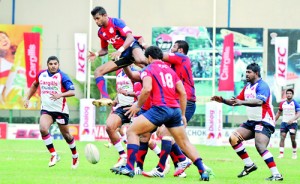Rugby’s money culture and the grasshoppers
View(s):Beaten 81-10 by CR who by themselves are trying to find their feet is a story of where to CH. Just as much as two new teams have swelled numbers in the league can the rugby people live happily ever after. The worry however is about the future of some of the old rugby playing clubs. Air Force who is stubborn with the policy of locals only will find it difficult to stay on par with nine other teams who are having foreign players.
Air Force is a plucky side with potential but find them at war with inadequate fire power. How long can the spunk of talented players last. Sun Tzu the 500 BC Military strategist said ‘If you are ignorant of both your enemy and yourself a battle may never be won”. The art of war need not be preached to battle hardened veterans but need arises to remind them of the futile exercise that is pursued in sticking on the high ground of a home grown policy.

CR and FC are making progress as a unit unlike their arch rivals CH and FC - File pic
Close on hand trying to find their feet are CR who did have a problem of player retention which according to the rugby hierarchy has been addressed. The retention according to the pundit is about managing a structure to look after the players. He however qualified that there cannot be a definite expectation as the mercenary attitude is stronger than club loyalty a thing of the past. Once a front runner CR is now hoping that they may make the six.
The worry that is real and is current is the plight of CH and FC. Their problem may not be next year but a setback happening this year. I spoke to Prashnatha Wimalasena the Chairman of Rugby and Secretary opined that sustainability is a rugby issue at the club. In the last two years the club has coughed out funds for rugby as they have not had a good sponsor. The question members ask is about continuing to pump money to a sport that was not bringing returns. The club has no problem with Cricket as they are supported by the Board while Hockey, Tennis and Squash look after themselves.
On top of that the prevalent culture is for the players to demand than perform. He said that the members dissent the demanding attitude and the players desire to want the team to be run their way. He said the players are setting ultimatums while not being committed while wanting has a say in selections. They also discourage new talent to secure their position. This he said is a cancer that needs to be tackled or else it will spread all over the game. He said that some of the ring leaders have been asked to stay away and they will look at building a team for the future.
Indika Kumar the captain had a different narration to unfold. With players leaving for other clubs that offer better terms: they have an inexperienced side. He said that they have only five players who have played two seasons of rugby. Anver the Manager of the team had a similar story to relate and said that they are affected by the change of the calendar too. CH is finding the road bumpy and full of potholes.
While funding is a problem as it will always be for a losing side there other issues that have plagued this old war horse.
The change of calendar has denied then the use of grounds as this is the cricket season. This was confirmed by the rugby management as well as the players.
The boys feel that they are committed but don’t have the support and facilities required for training of a Premier Club. They are also frustrated that they are not provided with what has been promised.
The management of rugby however feels that it is time to call enough and they have told the ring leaders to disperse and that the club will proceed with those who are willing and plan for a better team in the next two years.
Former players and a Rugby Administrators at CH and CR believed that all stories had two sides to be looked at. They said that the structure and process are most important if we are to market the clubs to a sponsor.
The club must be able to position themselves to attract sponsors. Funds are not the only determinant and maybe it is around 25% of the problem. The bigger problem is retention and building a feeling of belonging to somebody and this case a club. An enthusiast of rugby who is disengaging from the game said “In the past players were branded and recognized though the club and the supporters were proud to recognize the player.” Today some are known as grasshoppers and have no brand loyalty to offer. Another view was that there is a failure to recognize players as a human resource where in rugby the care factor is important.
Boys who come from the outstations need a place to stay and the money to live as some are unemployed. The medical policy, the money, the nutrition etc are important.
The club loyalty is a thing of the past and managing players and creating an environment is a key to survival in a money led jungle of rugby crossovers.
- Vimal Perera is a former Rugby Referee, coach and Accredited Referees Evaluator IRB



